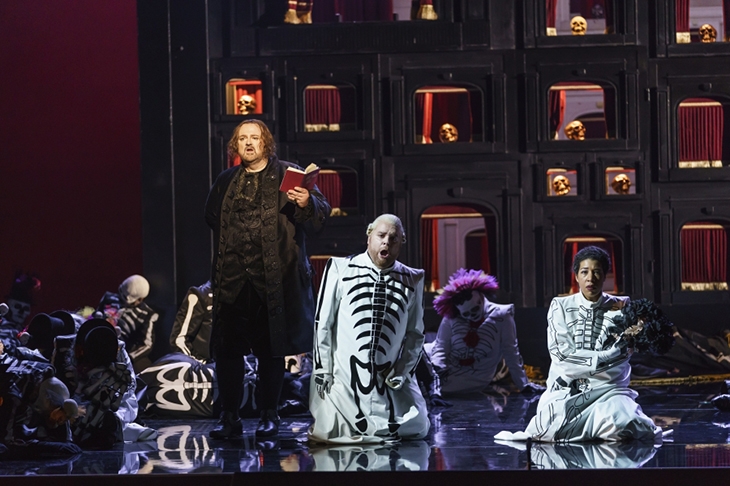Hector Berlioz was born on 11 December 1803 in rural Isère. ‘During the months which preceded my birth my mother never dreamed, as Virgil’s did, that she was about to bring forth a laurel branch,’ he writes in his Memoirs. ‘This is extraordinary, I agree, but it is true… Can it be that our age is lacking in poetry?’ And so on, for nearly 600 candid, facetious, outspoken pages. Berlioz’s Memoirs are the inner voice of the Romantic generation as you’ve always imagined it, and everyone who’s interested in music in the 19th century — no, scrub that, everyone who’s interested in European culture — should read them.
As a composer, though, Berlioz is all or nothing: either blazing through the heavens on the wings of some utterly idiosyncratic inspiration, or bumping clumsily in the mud, trying and failing to look Olympian. Which one can depend upon the performance as much as the work, so it’s worth dragging even his loopiest creations out into the sunlight once every few years. To mark the 150th anniversary of his death the BBC spent last weekend doing just that, nowhere more quixotically than in Glasgow where the BBC Scottish Symphony Orchestra under Pascal Rophé performed The Death of Cleopatra and the even rarer Lélio, or The Return to Life.
Cleopatra bears the scars of its creation during the 1829 Prix de Rome — a state-run competition so officiously Gallic that merely reading Berlioz’s description is enough to make you suspect that we can never truly belong in Europe. Competitors were locked in cells and required to set a compulsory text under conditions seemingly designed to stunt youthful inspiration into academic conformity. Berlioz made the mistake of attempting to create an actual work of art, and the jury refused to award a prize. Cleopatra, they said, displayed ‘dangerous tendencies’.
The principal danger in Glasgow came from the singing of Karen Cargill: commanding the stage with her stance alone, and holding her full vocal power in haughty reserve until the doomed Queen lets her poise drop and sends a jet of high-pitched pain spurting skywards. Cargill snarled, spat and soared until the fatal asp bite (the text is export-quality fustian: ‘A vile reptile is my recourse’) whereupon, with chilling control, she blanched all tone from that invincible voice and expired over juddering strings.
You could almost sympathise with the academicians. In a culture that still considered Beethoven too disturbing for mass consumption, what point of comparison could they possibly have found? They’d have run screaming from Lélio: a patchwork of short vocal and orchestral pieces, linked by a dramatic narration, which Berlioz intended to be performed as a sequel to the Symphonie fantastique. Obviously, no one ever does this, and the main question was just how coherently the whole batshit-crazy confection would hold together on its own.
Surprisingly well, as it turned out. Samuel West delivered Berlioz’s narration more-or-less straight, and Rophé went all out for orchestral colour. The musical numbers range from a clumsy drawing-room ballad to ‘The Aeolian Harp’, a quivering, Sibelius-like study in orchestral sonority. The final item, a fantasy on Shakespeare’s Tempest, pretty much embodies the Berlioz problem. It opens with sonic textures — piano, flutes, muted violins and echoing chorus —that wouldn’t be heard again until the age of Ravel. But it’s no good proclaiming yourself a martyr to the purity of Art if you go and end the thing with a cymbal-and-bass-drum blowout that would have made Rossini blush. Berlioz, perhaps, remains more fascinating as a personality than as a finished artist. Yet with every lopsided melody and flat-footed honk of the cornet-à-pistons, that personality becomes more compelling.
Meanwhile, you should go and see Welsh National Opera’s new production of Verdi’s Un ballo in maschera because of the singing and playing. As Riccardo and Renato, Gwyn Hughes Jones and Roland Wood make up in likeability, grace and warmth of tone what they might lack in Italianate vocal colour, while Mary Elizabeth Williams as Amelia has a voice of rich velvet with a willowy core and such quiet strength that even as Carlo Rizzi’s orchestra swells ominously beneath her, she can float her lines downwards without any chance of being drowned out. This is a fine team of principals, and the chorus and orchestra sound as if they’re just as invested in the drama.
David Pountney, as director, scrolls through a series of gloomy tableaux which — with costume styles ranging from Adam Ant to voodoo carnival — look terrific without always helping to tell the story. Then he fluffs the assassination scene, with a tricksy framing device that splits Riccardo into two separate characters. Read the programme essays and you’ll probably get it: doppelgängers, the Gothick, that sort of thing. ‘So, what actually happened?’ asked my companion, who’d mistakenly assumed that the action on stage would tell her everything she needed to know.






Comments